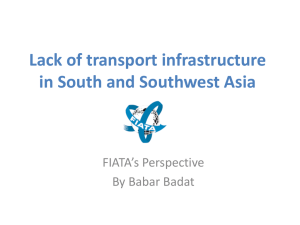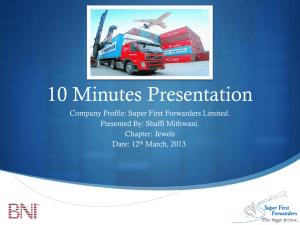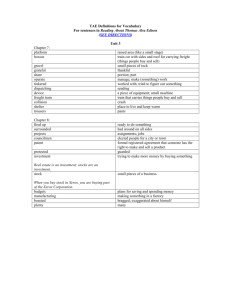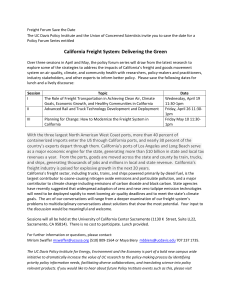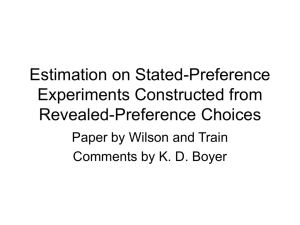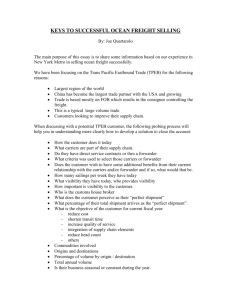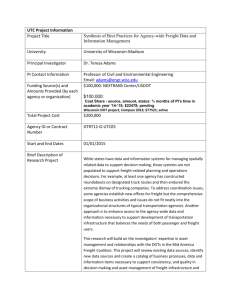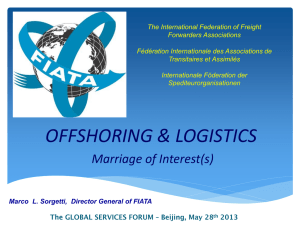Folie 1
advertisement
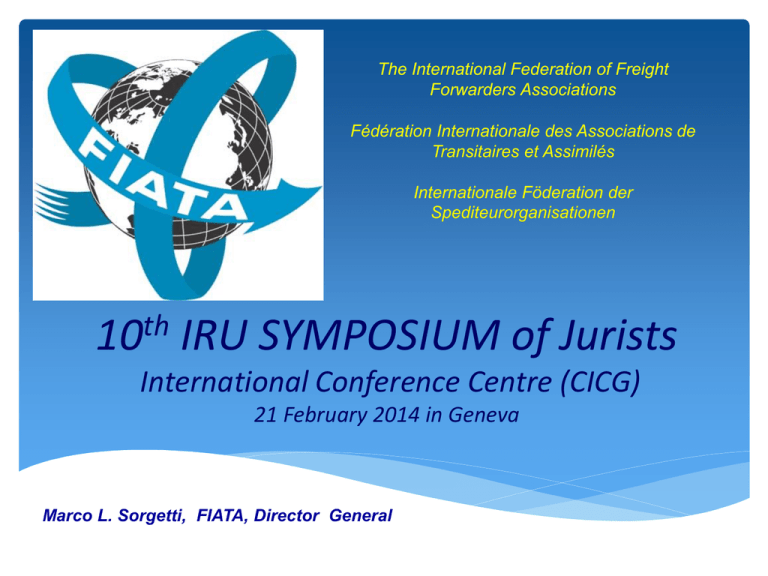
The International Federation of Freight Forwarders Associations Fédération Internationale des Associations de Transitaires et Assimilés Internationale Föderation der Spediteurorganisationen 10th IRU SYMPOSIUM of Jurists International Conference Centre (CICG) 21 February 2014 in Geneva Marco L. Sorgetti, FIATA, Director General Thank you! • FIATA appreciates this invitation to speak at IRU’s 10th Symposion of Jurists • FIATA appreciates the work and support of IRU and is pleased with the ongoing, mutually beneficial, collaboration • FIATA wishes to reciprocate the inviation by providing information to IRU members and invited guests about FIATA and its constituents in their role as trade facilitators. Global, unique constituency In October 2013 FIATA represents 113 Association Members in 110 countries 5843 individual Members in 164 countries Ageing with suitors FIATA was founded on 31th May 1926 in Vienna. FIATA is the largest non-governmental organization in the field of transportation. Its influence is worldwide. FIATA has consultative status with UN/ECOSOC (inter alia), UNECE, UNESCAP, ESCWA, UNCTAD, UNCITRAL, etc. FIATA is the recognised representative body of the freight forwarding and logistics industry for - UN & governmental organisations, e.g. ICAO, IMO, OECD, WCO, World Bank, WTO, etc. - private sector organizations, e.g. GACAG, GSF, IATA, ICC, IRU, UIC, etc. All below figures are dated 2011 Targeted work FIATA’s statutes’ objectives (article 2): The purpose of FIATA is to act as an umbrella organisation for the national and regional associations of freight forwarders throughout the world; to safeguard, promote and co-ordinate professional and branch interests on an international plane, in particular by: • Maintaining contacts with international and supra-national authority organisations and associations of transport and commercial • Being active in the determination of customary usage/regulations in international business. FIATA encourages all efforts deployed to create additional facilitation for traders in general and logistics service providers in particular. It creates instruments and standards for members and third parties, shippers, governments, etc. Working together in Institutes, Advisory Bodies, Working Groups Airfreight Institute AFI Advisory Body Security Matters Customs Affairs Insitute CAI Multimodal Transport Institute MTI WG Rail WG Road WG Sea Fiata vocational training The FIATA diploma is the benchmark for the industry in many countries across the globe, it can be expanded even further to increase Members’ knowledge base It ensures portability of credentials worldwide The target of the Foundation is to improve the professional qualifications worldwide by creating Train-the-Trainer courses in less privileged and emerging countries which have an important demand in professional education Trade Facilitation & FIATA documents • • • FIATA has created transport documents and uniform standards and good practice for forwarders worldwide Each document with distinctive colour and FIATA logo All FIATA documents will be made available electronically FIATA documents are multimodal native Description of services (since 2004) “Freight Forwarding and Logistic Services” means services of any kind relating to the carriage (performed by single mode or multimodal transport means), consolidation, storage, handling, packing or distribution of the Goods as well as ancillary and advisory services in connection therewith, including but not limited to customs and fiscal matters, declaring the Goods for official purposes, procuring insurance of the Goods and collecting or procuring payment or documents relating to the Goods. Freight Forwarding Services also include logistical services with modern information and communication technology in connection with the carriage, handling or storage of the Goods, and de facto total supply chain management. These services can be tailored to meet the flexible application of the services provided. Trade facilitation: a matter for collaborative environment As a partner of shippers and carriers the freight forwarder conciliates different interests and needs in the transportation chain, deploying its expertise and market competency. Freight forwarders provide brokerage and assistance in customs, excise, quality assessment, veterinary, phyto-sanitary, safety and security, i.e. de facto full regulatory compliance. Freight forwarders facilitate traders’ market access by providing consolidations and trade facilitation services. Freight forwarder and Customs agents fill all possible service requirements of shippers’ demand, regardless of modes of transport and compliance domains. The role of freight forwarders Freight forwarders may have a double role in logistics chains: They may act as intermediaries or agents (less frequently today) organising the shipments of goods according to customers’ individual needs, by contracting services with third parties. In so doing they are responsible for the choice of providers, but have no obligation of result They may act instead as principals (more frequently today) by providing contractual carriage from point to point and assume in such case a contractual obligation of result. Freight forwarders offering consolidated services (groupage) are always acting as principals. Acting as contractual carrier Freight forwarders acting as principals are the signatory of the contract with the shipper with an obligation of result: as such the freight forwarder undertakes the transportation of the goods, whether by air, inland waterway, rail, road or sea. The liability of freight forwarders acting as principal may vary according to different conditions, but quite often coincides with that of the carrier. The physical carrier is the owner or operator of the means of transport; as contracting party of the freight forwarder the carrier is liable according to the applicable convention or law. Objectives of freight agents The Freight forwarder acting as agent facilitates trade as intermediary between the shipper and the transport service providers (air, rail, road, sea). Its services include managing and overseeing the transportation process in: Procuring the main leg transportation contract for the shippers in liaising with carriers for booking, organisation and assistance Procuring land transportation for goods to final destination or from origin Issuing and completing the transport documentation as agents Providing or procuring the ancillary services conducive to the delivery of the goods, incl. Customs and insurance Other freight forwarders’ activities Freight forwarders may also perform other related activities and services, such as: assembling and stripping consolidated shipments stuffing goods into a CTU (Cargo Transport Unit) warehousing and distribution services customs clearances banking and insurance services consular, quality or otherwise trade related services In such services their role depend on the contractual arrangement with the shipper. In conclusion • Freight Forwarders are principal trade facilitators and are working globally; their responsibility may vary according to contractual arrangements. • Trade Facilitation needs industry good practice and business friendly regulatory environment – IRU and FIATA need to work together on similar issues. • FIATA works to build good practice and facilitation instruments in conjunction with its Association Members; FIATA provides: – Facilitation through FIATA DOCUMENTS and Model Rules – Training and awareness programme to enhance knowledge base in logistics (no drivers’ training at all) – Experienced a consistent advice to UN, regional authorities such as EU, APEC, MERCOSUR, NAFTA etc – Help for governments wishing to improve trade facilitation and logistics connectivity in their countries – Friendly and effective collaboration with similar organisations such a IRU, IATA, TIACA, WSC, ICS, GSF, ESC etc. LET US WORK TOGETHER! www.fiata.com Thank you!
